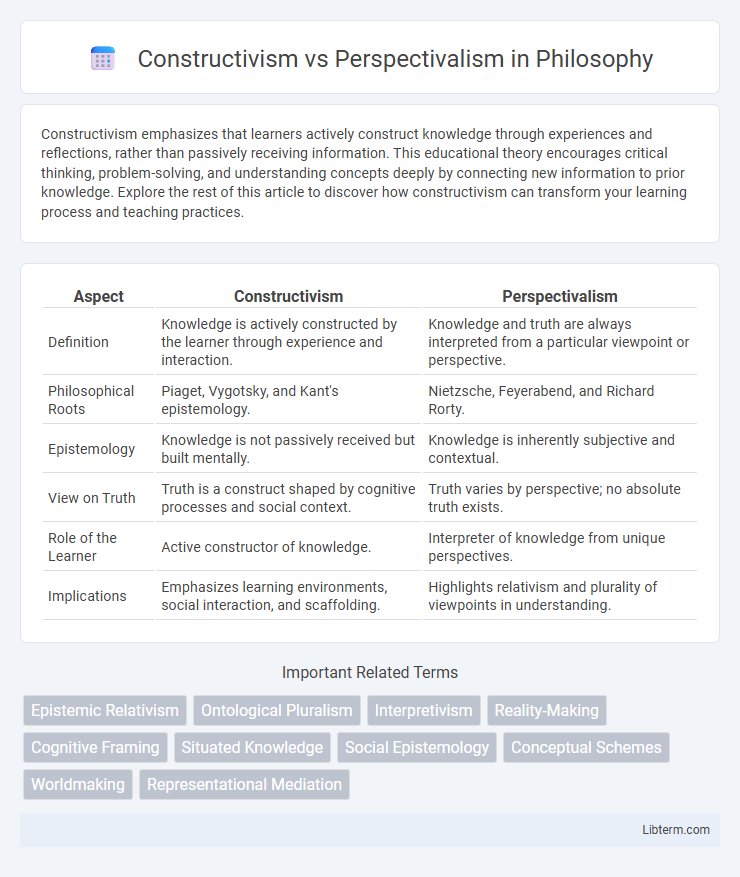Constructivism emphasizes that learners actively construct knowledge through experiences and reflections, rather than passively receiving information. This educational theory encourages critical thinking, problem-solving, and understanding concepts deeply by connecting new information to prior knowledge. Explore the rest of this article to discover how constructivism can transform your learning process and teaching practices.
Table of Comparison
| Aspect | Constructivism | Perspectivalism |
|---|---|---|
| Definition | Knowledge is actively constructed by the learner through experience and interaction. | Knowledge and truth are always interpreted from a particular viewpoint or perspective. |
| Philosophical Roots | Piaget, Vygotsky, and Kant's epistemology. | Nietzsche, Feyerabend, and Richard Rorty. |
| Epistemology | Knowledge is not passively received but built mentally. | Knowledge is inherently subjective and contextual. |
| View on Truth | Truth is a construct shaped by cognitive processes and social context. | Truth varies by perspective; no absolute truth exists. |
| Role of the Learner | Active constructor of knowledge. | Interpreter of knowledge from unique perspectives. |
| Implications | Emphasizes learning environments, social interaction, and scaffolding. | Highlights relativism and plurality of viewpoints in understanding. |
Introduction to Constructivism and Perspectivalism
Constructivism asserts that knowledge is actively constructed by individuals through their experiences and interactions, emphasizing the role of cognitive processes in shaping understanding. Perspectivalism, on the other hand, emphasizes that knowledge and truth are always interpreted from particular perspectives, suggesting that objective reality is inaccessible without the influence of subjective viewpoints. Both epistemological theories challenge traditional notions of absolute knowledge but differ in their focus on individual construction versus interpretive frameworks.
Historical Origins and Philosophical Roots
Constructivism originated in the early 20th century with roots in the works of Kant and Piaget, emphasizing knowledge as actively constructed by cognitive processes influenced by social and cultural contexts. Perspectivalism traces back to Nietzsche's philosophy, highlighting the plurality of viewpoints and the subjective nature of truth shaped by individual perspectives and historical conditions. Both frameworks challenge absolute objectivity but differ in epistemological focus: Constructivism on knowledge formation and Perspectivalism on interpretative variance.
Core Principles of Constructivism
Constructivism centers on the idea that knowledge is actively constructed by individuals through experience and interaction, emphasizing subjective understanding shaped by social and cultural contexts. It asserts that reality is not objective but rather constructed through cognitive processes, where learners create meaning based on prior knowledge and new information. Core principles include the importance of context, the active role of the learner, and the social nature of knowledge construction.
Key Tenets of Perspectivalism
Perspectivalism asserts that knowledge and truth are always situated within particular perspectives, emphasizing the role of context, interpretation, and subjective experience in shaping understanding. Unlike Constructivism, which focuses on knowledge as constructed through social processes and interactions, Perspectivalism highlights the pluralistic and often incommensurable nature of different viewpoints. This approach insists that no single perspective holds a monopoly on truth, promoting a more relativistic and dynamic interpretation of reality.
Comparing Epistemological Frameworks
Constructivism asserts knowledge is actively constructed by individuals through experience and social interaction, emphasizing the subjective nature of understanding. Perspectivalism proposes that knowledge is always from a particular perspective, highlighting the partial and contextual character of truth claims. Both frameworks challenge traditional notions of objective knowledge but differ in their emphasis on individual cognition versus contextual viewpoints in epistemology.
Reality, Truth, and Objectivity
Constructivism posits that reality is socially constructed, emphasizing that truth and objectivity are contingent upon collective human perception and cultural contexts. Perspectivalism argues that reality and truth are always interpreted through individual perspectives, making objectivity a multiplicity of viewpoints rather than an absolute state. Both frameworks challenge traditional notions of an independent, objective reality by highlighting the role of human cognition and interpretation in shaping knowledge.
Implications for Knowledge Construction
Constructivism emphasizes knowledge construction as an active, context-dependent process shaped by social interactions and individual experiences, highlighting the role of cognitive development in understanding reality. Perspectivalism posits that all knowledge is inherently situated within specific viewpoints, implying that objective truth is inaccessible and knowledge varies with interpretative frameworks. These contrasting epistemologies impact educational strategies, emphasizing collaborative meaning-making in constructivism and critical examination of diverse perspectives in perspectivalism to foster deeper understanding.
Critiques and Debates: Strengths and Weaknesses
Constructivism faces critiques for its potential relativism, which some argue undermines objective knowledge by emphasizing social constructions over empirical facts. Perspectivalism is challenged for possibly promoting epistemic pluralism to an extent that complicates consensus-building and truth claims, as it prioritizes multiple viewpoints without a clear hierarchy. Both frameworks stimulate debates on the balance between subjective interpretation and objective reality, highlighting strengths in fostering critical analysis and weaknesses in risking fragmentation of knowledge.
Applications in Science, Education, and Society
Constructivism emphasizes knowledge construction through active learner engagement, impacting education by promoting experiential learning and self-discovery in science curricula. Perspectivalism, highlighting the role of different viewpoints, informs scientific inquiry by acknowledging diverse interpretations and cultural context in theory development. Both frameworks influence society by encouraging critical thinking, inclusivity in knowledge production, and adaptability to multiple perspectives in addressing complex problems.
Conclusion: Bridging Constructivism and Perspectivalism
Bridging Constructivism and Perspectivalism involves recognizing that knowledge is both constructed through social processes and shaped by unique individual perspectives. Integrating these frameworks highlights how subjective viewpoints influence the construction of reality without dismissing the collaborative nature of understanding. This synthesis promotes a more nuanced epistemology that respects diversity while grounding knowledge in shared, yet individually interpreted, experiences.
Constructivism Infographic

 libterm.com
libterm.com